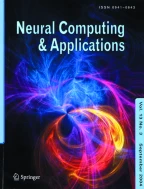Abstract
This paper studies the electrical synapse coupling synchronization of Hindmarsh-Rose neurons as well as the effect that Gaussian white noise has on coupling neuron synchronization through theoretical analysis and numerical simulation. The study has found the coupling strength can affect the electrical activity of neuron coupling system and the synchronization status between coupling neurons. Adjusting the coupling strength between the neuron systems can make two asynchronous neuron systems synchronized. The study has also found that proper noise can prompt asynchronous Hindmarsh-Rose neuron electrical synapse coupling to be synchronous and evoke electrical synapse coupling neuron synchronization.
Similar content being viewed by others
Explore related subjects
Discover the latest articles, news and stories from top researchers in related subjects.References
Shou TD (2006) Neurobiology. Higher Education Press, Beijing
Wu KJ, Luo TQ, Lu HW, Wang Y (2015) Bifurcation study of neuron firing activity of the modified Hindmarsh–Rose model. Neural Comput Appl 27(3):1–9
Gray CM, König P, Engel AK, Singer W (1989) Oscillatory responses in cat visual cortex exhibit inter-columnar synchronization which reflects global stimulus properties. Nature 338(6213):334–337
Steinmetz PN, Roy A, Fitzgerald PJ, Hsiao SS, Johnson KO, Niebur E (2000) Attention modulates synchronized neuronal firing in primate somatosensory cortex. Nature 404(6774):187–190
Niebur E, Hsiao SS, Johnson KO (2002) Synchrony: a neuronal mechanism for attentional selection? Curr Opin Neurobiol 12(2):190–194
Fell J, Fernández G, Klaver P, Elger CE, Fries P (2003) Is synchronized neuronal gamma activity relevant for selective attention? Antibiotica 6(4):358–362
Pyragas K, Popovych OV, Tass PA (2007) Controlling synchrony in oscillatory networks with a separate stimulation-registration setup. EPL 80(4):L53–L56
Mormann F, Kreuz T, Andrzejak RG, David P, Lehnertz K, Elger CE (2003) Epileptic seizures are preceded by a decrease in synchronization. Epilepsy Res 53(3):173–185
Lewis SJG, Barker RA (2009) Understanding the dopaminergic deficits in Parkinson’s disease: insights into disease heterogeneity[J]. J Clin Neurosci 16(5):620–625
He J, Cai J (2014) Parameter modulation for secure communication via the synchronization of chen hyperchaotic systems. Syst Sci Control Eng An Open Access J 2(1):718–726
Iqbal M, Rehan M, Khaliq A, Rehman SU, Hong KS (2014) Synchronization of coupled different chaotic fitzhugh-nagumo neurons with unknown parameters under communication-direction- dependent coupling. Comput Math Methods Med 2014(1):98–119
Naderi B, Kheiri H, Heydari A, Mahini R (2016) Optimal synchronization of complex chaotic t-systems and its application in secure communication. J Control Autom Electr Syst 27(4):379–390
Bazhenov M, Huerta R (1998) Cooperative behavior of a chain of synaptically coupled chaotic neurons. Phys D-nonlinear Phenom 116(3–4):392–400
Yoshioka M (2005) Cluster synchronization in an ensemble of neurons interacting through chemical synapses. Phys Rev E 71(1):223–284
Dhamala M, Jirsa VK, Ding M (2004) Transitions to synchrony in coupled bursting neurons. Phys Rev Lett 92(2):537–547
Belykh I, Lange ED, Hasler M (2005) Synchronization of bursting neurons: what matters in the network topology. Phys Rev Lett 94(18):188101
Postnova S, Voigt K, Braun HA (2007) Neural synchronization at tonic-to-bursting transitions. J Biol Phys 33(2):129–143
Wang QY et al (2005) Transition to complete synchronization via near-synchronization in two coupled chaotic neurons. Chin Phys 94(1):25–39
Wang QY, Lu QS, Chen GR, Guo DH (2006) Chaos synchronization of coupled neurons with gap junctions. Phys Lett A 356(1):17–25
Yuan DD, Chen X, Duan LX (2015) Bifurcation analysis of synchronous bursting patterns and transitions of coupled neurons in pre-Botzinger complex. J Dyn Control 13(4):266–270
Jahn K, Grosskreutz JK, Ziegler E, Schlesinger F, Grothe C, Dengler R et al (2006) Temporospatial coupling of networked synaptic activation of ampa-type glutamate receptor channels and calcium transients in cultured motoneurons. Neuroscience 142(4):1019–1029
Zhou C, Kurths J, Kiss IZ, Hudson JL (2002) Noise-enhanced phase synchronization of chaotic oscillators. Phys Rev Lett 89(1):2409–2428
Zhou C, Kurths J (2002) Noise-induced phase synchronization and synchronization transitions in chaotic oscillators. Phys Rev Lett 88(23):2306–2322
Postnov DE, Sosnovtseva OV, Han SK et al (2000) Stochastic synchronization of coupled coherence resonance oscillators. Int J Bifurc Chaos 10(11):2541–2550
Casado JM (2003) Synchronization of two hodgkin–huxley neurons due to internal noise. Phys Lett A 310(5–6):400–406
Balenzuela P, Garcíaojalvo J (2005) Role of chemical synapses in coupled neurons with noise. Phys Rev E Stat Nonlin Soft Matter Phys 72(1):254–271
Wu Y, Xu J, He D, Earn DJD (2005) Generalized synchronization induced by noise and parameter mismatching in Hindmarsh–Rose neurons. Chaos Solitons Fractals 23(5):1605–1611
Li N, Yang XL (2015) Synchronous dynamics of small-world neuronal network system with spatially correlated white noise. Acta Phys Sin 64(22):82–90
Xu GL (2013) Dynamic characteristics research of neuron model. Doctoral dissertation, Lanzhou Jiaotong University
Tsaneva-Atanasova K, Osinga HM, Rieß T, Sherman A (2010) Full system bifurcation analysis of endocrine bursting models. J Theor Biol 264(4):1133–1146
Wang HX, Lu QS (2006) Some notes on complete synchronization of the coupled neurons. J Beijing Univ Aeronaut Astronaut 32(3):320–323
Wu D, Luo X, Zhu S (2007) Stochastic system with coupling between non-gaussian and gaussian noise terms. Phys A 373(36):203–214
Li M (2013) Power spectrum of generalized fractional gaussian noise. Adv Math Phys 9(4):594–603
Acknowledgements
This work was supported by the National Natural Science Foundation of China(No. 11362008), the National Social Science Foundation of China (No. 15CGL001), the Natural Science Fund Project of Gansu Province (No. 148RJZA047) and the Basic Scientific Research Expenses of Finance Department of Gansu Province (No.214150).
Author information
Authors and Affiliations
Corresponding author
Ethics declarations
Conflict of interest
The authors declare that they have no conflict of interest.
Rights and permissions
About this article
Cite this article
Wu, K., Wang, T., Wang, C. et al. Study on electrical synapse coupling synchronization of Hindmarsh-Rose neurons under Gaussian white noise. Neural Comput & Applic 30, 551–561 (2018). https://doi.org/10.1007/s00521-016-2681-1
Received:
Accepted:
Published:
Issue Date:
DOI: https://doi.org/10.1007/s00521-016-2681-1
